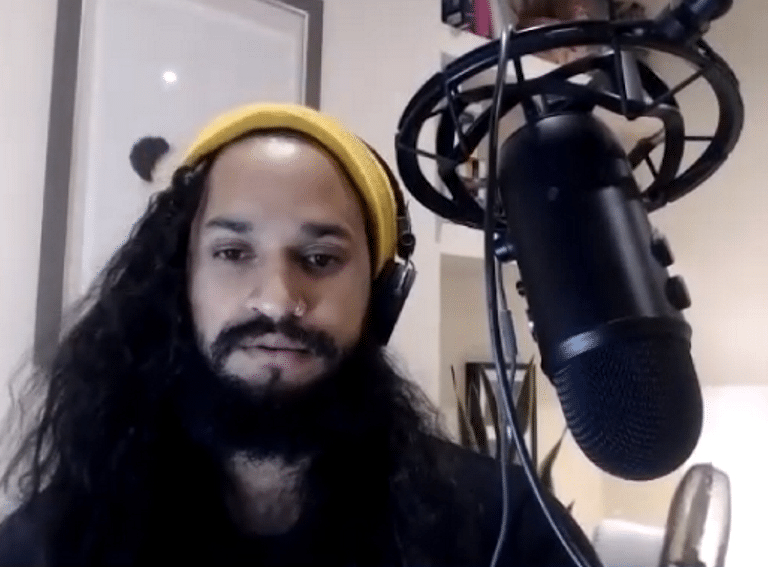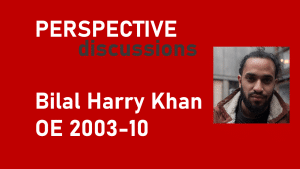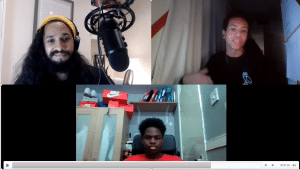
Old Elizabethan Bilal Harry Khan threw down a challenge when he took part in a video conversation about ‘micro-aggressions’ as part of a new series of bitesize discussions on vital issues such as race and discrimination.
Anyone accused of perpetrating micro-aggressions should overcome the natural instinct to go on the defensive and instead be open enough to “interrogate the ideas at the root of things that may be causing harm”, urged Bilal, a podcaster, workshop facilitator and event host.
 His ten-minute conversation with Year 13 pupils Thomas Mgbor and Ayodimeji Ojelade was recorded so that the issues raised can be discussed in tutor groups. It is one of a series of Perspective discussions being arranged by the School’s Equality, Diversity and Inclusion Ambassadors. Last year, Ayodimeji and Thomas were instrumental in the founding of Perspective – a new forum set up in the wake of the Black Lives Matter protests.
His ten-minute conversation with Year 13 pupils Thomas Mgbor and Ayodimeji Ojelade was recorded so that the issues raised can be discussed in tutor groups. It is one of a series of Perspective discussions being arranged by the School’s Equality, Diversity and Inclusion Ambassadors. Last year, Ayodimeji and Thomas were instrumental in the founding of Perspective – a new forum set up in the wake of the Black Lives Matter protests.
Michael Feven, Assistant Head (Pupil Development), said: “I am so pleased to see these short, accessible discussions taking place, and I thank especially Old Elizabethans such as Bilal who have agreed to take part. Thomas, Ayodimeji and the ambassadors’ team are to be congratulated on being so assiduous in ensuring that these important issues are both raised and discussed at QE.”
Other conversations in the series so far have included one with Natasha Devon MBE, an activist and researcher in the fields of mental health, body image, gender and social equality.
Bilal (OE 2003–2010) read Theology at Cambridge and then worked in youth engagement. He has designed and delivered hundreds of speeches and workshops in schools and youth settings on behalf of partners such as KPMG, Virgin Atlantic, Boots and Barclays. He is also frequently called upon to speak on issues of social justice, race and masculinity for news and current affairs programmes.
Bilal began the discussion by defining micro-aggressions: “They are statements, actions or incidents which are regarded as indirect, subtle or unintentional discrimination against members of a marginalised group, such as a racial or ethnic minority. The key bit for me is the words ‘indirect, subtle or unintentional’…These are things which are unintentional, but are still harmful or hurtful, when somebody might say ‘ah, but I meant that in a nice way,’ or ‘that was just a bit of banter’ or ‘that was supposed to be a compliment’. “
He gave an example from his own experience: “That question: ‘Where are you from? No – where are you really from?’ Where you have said you are really from is never the right answer. They want to know where your grandparents or great-grandparents are from; when I say ‘north-west London’ that is not believed.”
 Bilal continued: “It’s the cumulative impact of loads of micro-aggressions that really makes someone feel like ‘I don’t belong here’ or ‘I am angry’ or ‘I am ashamed’ or perhaps that there is ‘something about me that is not right’.”
Bilal continued: “It’s the cumulative impact of loads of micro-aggressions that really makes someone feel like ‘I don’t belong here’ or ‘I am angry’ or ‘I am ashamed’ or perhaps that there is ‘something about me that is not right’.”
He suggested that QE pupils should be a true “ally” by challenging micro-aggressions not only when someone who might be hurt or harmed by them is present, but also when they are absent. He urged boys to be “more confident and comfortable to challenge and question, and also just to own up and apologise when we have said and done these things”.
Thomas asked Bilal how he would respond to those who would suggest we are turning into a “snowflake community”.
“This is not about being ‘woke’ or hyper-sensitive or being ‘snowflakes’,” Bilal said. “It’s about recognising that these issues have actually been used as tools of oppression for centuries.”
